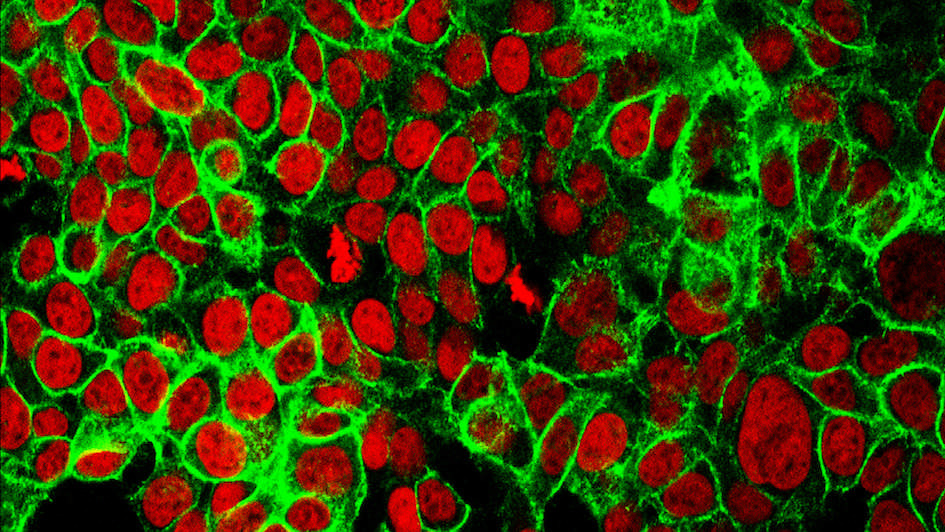
Image: Human colon cancer cells with the cell nuclei stained red and the protein E-cadherin stained green. Credit: NCI Center for Cancer Research via Flickr
Combining three targeted drugs together could block drug resistance in bowel cancer patients, a new study shows.
Scientists found that bowel cancer cells evolve resistance in response to two molecularly targeted cancer drugs through mutation of their targets – but using three drugs together was enough to keep resistance at bay.
Patients often respond initially to new targeted cancer drugs, only to later relapse as their cancers stop responding to treatment and start growing once again. This is a major challenge facing scientists in drug development.
But the new study found that a triple attack could be effective in bowel cancer – and potentially many other tumour types – by overcoming cancer’s ability to adapt, evolve and evade the effects of treatment.
Raising the bar too high for resistance
Scientists at The Institute of Cancer Research, London, examined 47 bowel cancer cells lines to help understand the exactly how resistance to drugs arises as the cancer evolves to escape treatment
The study is published in Oncogene today (Monday) and was funded by Cancer Research UK.
The researchers found that bowel cancer cells mutated and evolved to acquire resistance to treatment when grown under the selective pressure of two molecularly targeted cancer drugs.
In order to overcome this resistance and prevent any further resistance developing, the researchers added in a third drug – raising the bar too high for cancer cells by requiring them to be able to evade three different drugs at once in order to survive.
Research at the ICR is underpinned by generous contributions from our supporters. You can contribute to our mission to make the discoveries to defeat cancer.
Donate now
Understanding how resistance occurs
In bowel cancer – the fourth most common cancer in the UK – cells often become resistant to targeted treatment through mutations that affect ‘on/off’ signalling molecules, causing them to be stuck in the ‘on’ or ‘off’ position.
In order to understand how cancer evolves to develop resistance, scientists exposed bowel cancer cells to increasing levels of two drugs which inhibit these ‘on/off’ switches.
These drugs were cobimetinib and pictilisib – the latter of which was discovered in a collaboration between The Institute of Cancer Research (ICR) and industry partners, and is now being used in clinical trials for several cancer types.
At first the drugs worked together to stop cancer cells growing in almost all of the bowel cancer cell lines.
However, when one of the responsive cell lines was exposed to the drugs for a period of eight to 10 weeks, the cells developed resistance to the drug combination, resulting from a loss of or reduced sensitivity to one of the two drugs.
The triple attack
The researchers noticed that the bowel cancer cells were dependent on a group of molecules called the BCL-2 family for survival – which regulate cell death.
When they exposed cells for several weeks to a triple combination of cobimetinib, pictilisib and a third drug called navitoclax which inhibits molecules in the BCL-2 family, the emergence of resistance was completely blocked.
Combinations of targeted treatments that attack cancer in multiple ways at once have huge potential for preventing the disease from evolving resistance – using the same approach as in successful treatments for HIV and tuberculosis.
Further research is now required to assess the drug combination in animal studies. The researchers also warned that care would need to be taken to monitor the tolerability of using the drugs simultaneously, in which case the dosing may need to be staggered to minimise side effects.
Blocking off cancer's escape route
Study author Dr Paul Clarke, Senior Researcher in Signal Transduction and Molecular Pharmacology at the ICR, said:
“Our study shows the potential to use multiple targeted drugs together to overcome drug resistance in cancer, just as occurs in other diseases like HIV.
“At the ICR, we are interested in using the principles of evolutionary biology to understand how cancer can change over time and adapt to treatment – and what we can do to prevent this resistance from developing.
“We have shown that a three-pronged attack can be effective against bowel cancer cells by blocking off their various escape routes from treatment.
“The research is still at a fairly early stage, but in principle combinations of targeted drugs could be similarly effective against many other cancer types.”
Study co-author Professor Paul Workman, Chief Executive at the ICR, said:
“Cancer patients often respond very well initially to modern targeted drugs, but there is always the concern that the cancer will evolve to resist treatment.
“Our study dissected out the molecular mechanisms by which bowel cancer cells evolve to become drug resistant to two modern targeted drugs used as single agents or in a two drug combination, and has applied the knowledge gained to the design of a new triple combination treatment.
“Further research is needed, but we think this triple combination of targeted drugs has the potential to help patients respond to treatment for much longer.”
Professor Charles Swanton, Chief Clinician at Cancer Research UK, said:
"These early data in cell lines suggest that taking advantage of existing drugs and combining them might help to prevent cancer drug resistance.
"Further research in the lab and eventually clinical trials will help us find out if this is safe and effective for people with colorectal cancer.”